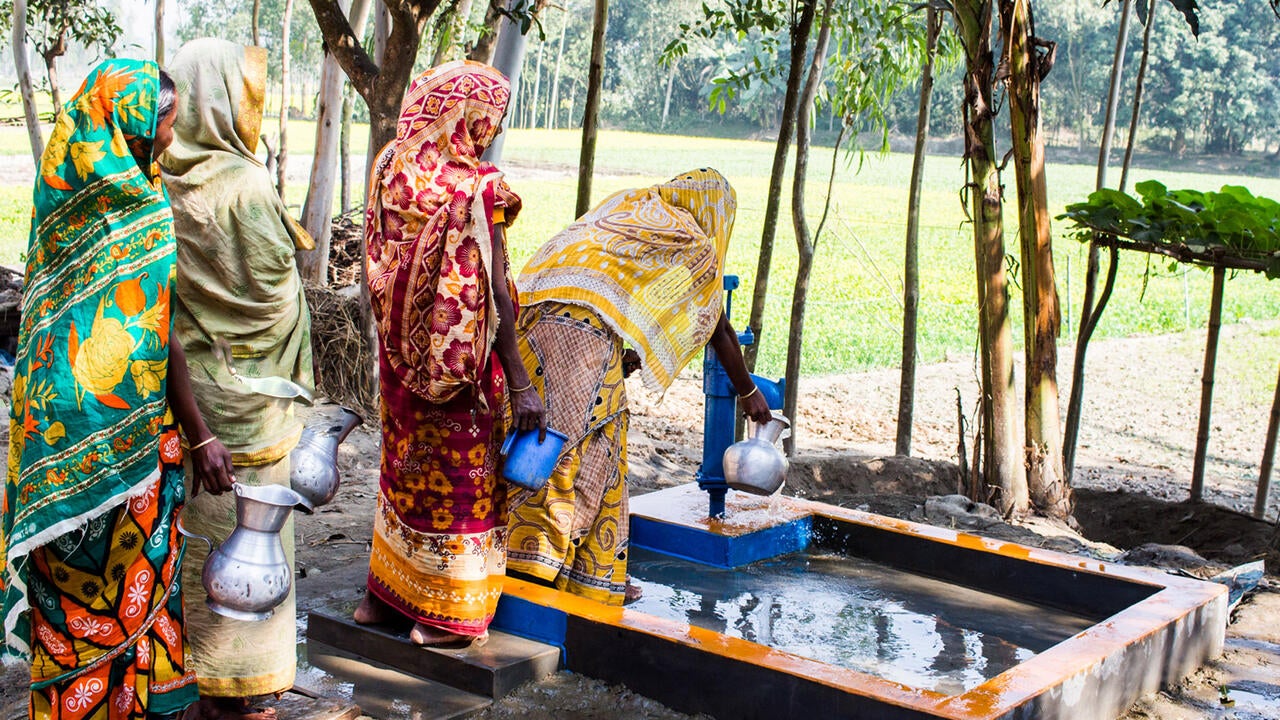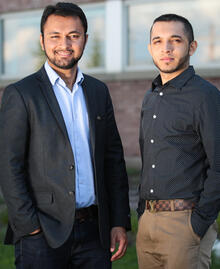
Student aid project inspires new grads to launch Engineers for Hope
Instead of starting well-paid jobs, the grads are building a non-profit organization that will bring clean water and sanitation to developing communities

Instead of starting well-paid jobs, the grads are building a non-profit organization that will bring clean water and sanitation to developing communities
By Brian Caldwell Faculty of EngineeringIt was awkward at first, but Rumman Rahman eventually got used to appreciative older women tousling his hair and wishing him long life during a student-led aid project in rural Bangladesh last fall.
Admitting he couldn’t help everybody in the desperately poor village of Khukshia was another matter.
Working on a shoestring $8,000 budget, just enough to construct eight wells and eight sanitary toilets, the University of Waterloo civil engineering student regularly had to turn down other area residents who came to him with the same pressing needs.
“It was heartbreaking because we couldn’t do it,” says Rahman, 23, who grew up in Bangladesh but had never experienced such poverty first-hand. “They would talk about how they don’t have jobs, how their children are suffering with diseases because of the bad water.”
Six months later, as they work full-time to build on the success of the student project, Rahman and classmate Nirbhay Singh, pictured below, are motivated by both the satisfaction of significantly improving hundreds of lives and the frustration of not being able to do more.

Instead of starting well-paid jobs after graduating June 17, they’re setting up Engineers For Hope as a not-for-profit organization at the Accelerator Centre and planning for another humanitarian aid project.
The four other founders of the original student group - Adnan Abu Atiya, Tariq Hasan, Shihab Saadeldeen and Youssef Zaki - will also remain involved with the social startup in various capacities.
"I’m still young, not a lot of pressure,” says Singh, 22, who came to Waterloo from India as an international student. “It’s a perfect time to take a risk and go all in on such a motivating project."
The initial effort goes back to the summer of 2015, when six engineering students with ties to developing countries came up with the idea to use their personal experiences, educations and Waterloo connections to make a real difference.
They created a student design team, lined up sponsors, sold donuts to raise funds and collaborated with Sjouk, a non-governmental organization in Bangladesh, on plans to build communal infrastructure in a village with no electricity, dirt roads, small sheds for housing and a chronic shortage of clean, safe drinking water.
After overcoming numerous hurdles, Rahman made it there last fall, spending four months overseeing construction for the group while traveling to the village from a nearby city on the back of a motorcycle.
Living conditions were eye-opening and the first lesson he learned is that even the best-laid construction plans have to be modified in the field to cater to local needs and preferences. Everything took longer than expected.
Still, wells with hand pumps and toilets with holding tanks were successfully built for use by more than half of the village’s 1,750 residents, most of whom have household incomes of less than $3.30 a day.
“I felt proud, to be honest,” says Rahman, who was followed around by excited children and welcomed into homes to drink cup after cup of coconut water traditionally reserved for special guests. “These people, they don’t have much, and the smallest, simplest things make them so happy.”
For their follow-up project, Rahman, Singh and the other founders want to take Engineers For Hope to rural India to do work involving water, sanitation and education. Their ambitious plans also include establishing overseas offices and chapters at other universities, both in Canada and internationally.
“This feeling is better than having a job,” Rahman says. “It’s the satisfaction that you can make a difference. Now that we have a platform to do so, we want to take full advantage of it.”

Read more
How Doug Kavanagh’s software engineering degree laid the foundation for a thriving career in patient care

Read more
Upside Robotics secures new funding to accelerate the future of sustainable farming

Read more
Redefining capstone learning by bringing students, faculty and community partners together to tackle real-world challenges
Read
Engineering stories
Visit
Waterloo Engineering home
Contact
Waterloo Engineering
The University of Waterloo acknowledges that much of our work takes place on the traditional territory of the Neutral, Anishinaabeg, and Haudenosaunee peoples. Our main campus is situated on the Haldimand Tract, the land granted to the Six Nations that includes six miles on each side of the Grand River. Our active work toward reconciliation takes place across our campuses through research, learning, teaching, and community building, and is co-ordinated within the Office of Indigenous Relations.